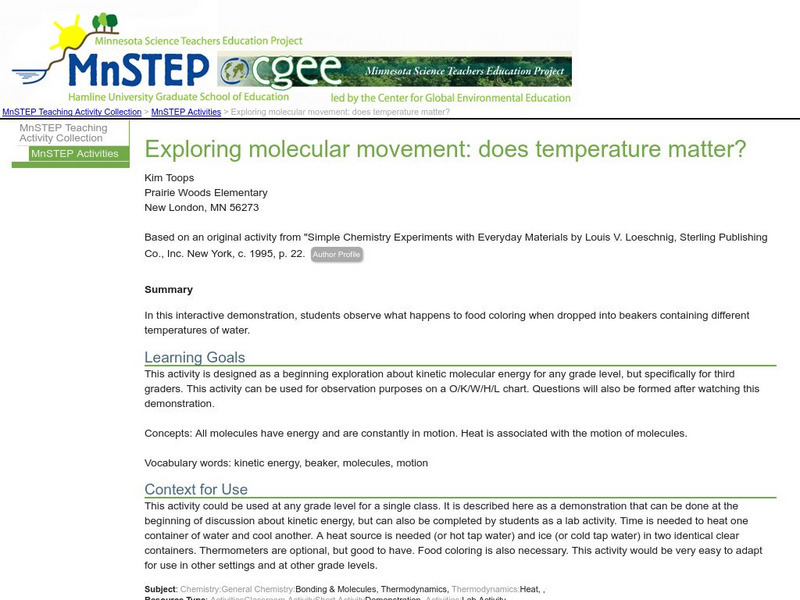Science Education Resource Center at Carleton College
Serc: Exploring Molecular Movement: Does Temperature Matter?
In this interactive demonstration, students observe what happens to food coloring when dropped into beakers containing different temperatures of water.
American Chemical Society
Middle School Chemistry: Changing State: Freezing
Students investigate how low temperature causes water vapor to condense into a liquid and then freeze to form a solid.
American Chemical Society
Middle School Chemistry: Changing State: Melting
Discover the concept that energy transfer and molecular motion cause the change in state from a solid to a liquid. Also compare state changes of water to the state changes of other substances.
Science Education Resource Center at Carleton College
Serc: Plastic Polymers: Investigating Their Flexibility
Young scholars will use their prior knowledge about changes of matter to develop a hypothesis to test the physical properties of materials such as plastic (polymers) and how its chemical properties allow it to have unique physical...
Science Education Resource Center at Carleton College
Serc: Exploring Molecular Movement: Does Temperature Matter?
In this interactive demonstration, young scholars observe what happens to food coloring when dropped into beakers containing different temperatures of water.
American Chemical Society
Middle School Chemistry: Air: It's Really There
Investigation shows that gas takes up space and has mass, and that the motion of gas molecules is affected by heating and cooling.
American Chemical Society
Middle School Chemistry: What Is Density?
Calculate the density of cubes made of different materials to determine what type of material it contains. Using this information explain that the size, mass, and arrangement of the atoms or molecules of a substance determines its density.
American Chemical Society
Middle School Chemistry: Chapter 1: Solids, Liquids, and Gases
Five exemplary chemistry lessons about the three states of matter complete with handouts and animations.
Science Education Resource Center at Carleton College
Serc: Marshmallow Models
This chemistry instructional activity will test young scholars' understanding of VESPR structures. They will use marshmallows and redhots to investigate molecules, acids, and polyatomic ions.
Science Education Resource Center at Carleton College
Serc: Mystery Material
Middle schoolers will investigate an unknown material by determining its properties and categorizing its state of matter. They will observe how it behaves under different conditions, record their observations, analyze information, and be...
ArtsNow
Arts Now Learning: Be One With the Water [Pdf]
Fourth graders will explore states of matter and the water cycle by bringing water to life with their bodies. By enacting the changes that water molecules experience, 4th graders will learn scientific information kinesthetically.
Utah STEM Foundation
Utah Stem Action Center: Salt Dissolved in Great Salt Lake
In this lesson, students will compare water from a fresh lake to water from the Great Salt Lake to begin to build a conceptual model for how salt dissolves in water. The lesson focuses on students using and developing models of molecules...





